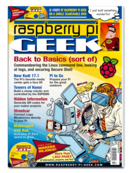The Raspberry Pi Foundation spreads the word in the US Midwest
More than 200 people gathered in Kansas City, Missouri, at Science City, Union Station, on August 23 to meet Rob Bishop, Raspberry Pi engineer and evangelist. The audience spanned a wide range of ages, including parents and grandparents with children, retirees, hobbyists, students, teachers, and artists. Kansas City was yet another stop on the Midwestern leg of Bishop's "Raspberry Pi US Roadshow."
After being introduced to the crowd by Luis Rodriguez, employee of Science City and producer of Maker Faire, Kansas City, Bishop spoke for about 20 minutes, introducing the Raspberry Pi and telling the story of the Raspberry Pi Foundation (see "The Raspberry Pi Story"), before opening the floor to questions.
Q&A
The first question Bishop fielded from the audience was about worldwide Rasp Pi sales. He noted that about one third of Pis are sold in the US, one third in Europe, and one third in the rest of the world. That means, per capita, sales are lower in the US than in the UK and the rest of Europe, which is a troubling statistic and one reason to institute the US roadshows.
[...]
Buy this article as PDF
Pages: 2
(incl. VAT)






